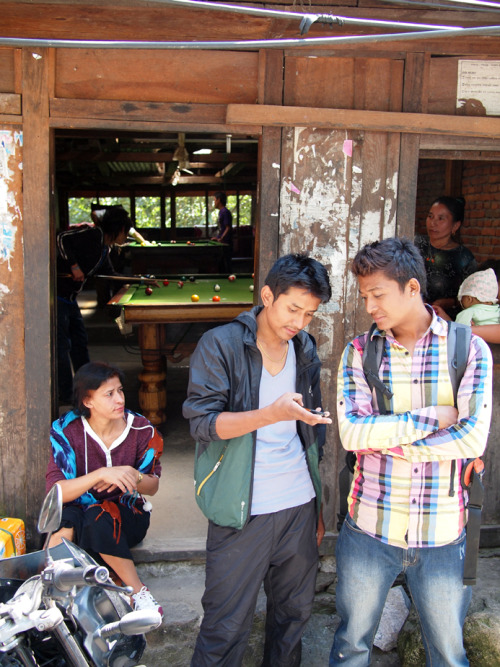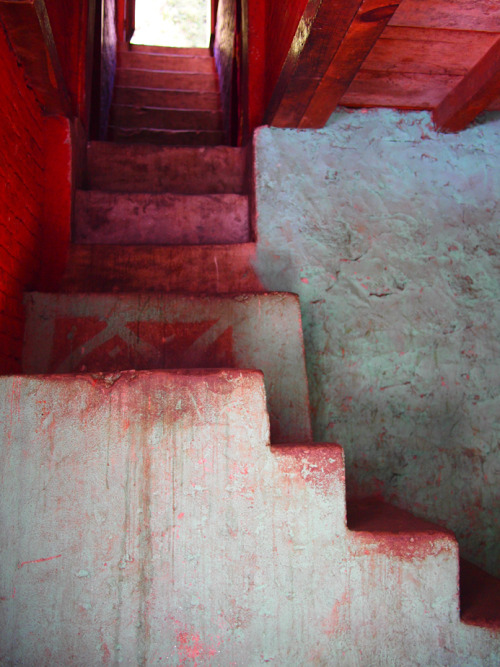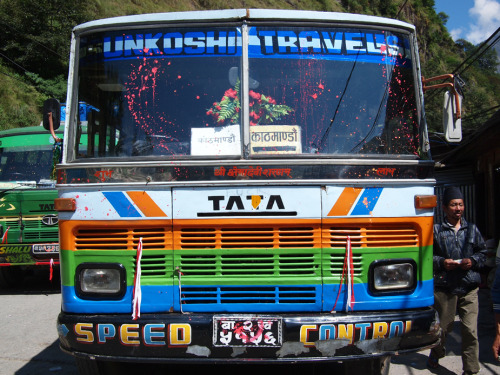
Hey y’all, what’s happening? I feel like I haven’t seen you in
forever. I just arrived in Kathmandu, Nepal and I’ve got a pocket full
of monopoly money that’s eager to get spent on something with cheese in
it. Last we spoke I was in Chengdu hanging out with a bunch of pandas.
Soon after I boarded a two-day train headed for Lhasa, Tibet.
Entering Tibet is a highly bureaucratic process. China controls
everything that happens there; who enters, who leaves, what people talk
about, even down to what you’re allowed to wear. Come into Lhasa wearing
a “Free Tibet” shirt and you can get yourself arrested by any of the
hundreds of Chinese soldiers that are patrolling the streets twenty-four
hours a day with machine guns and rifles. The same will happen if you
are seen photographing them. Either that or they’ll confiscate your
camera and destroy it. Tibetans are not allowed to have passports, they
can’t leave, their phone calls are monitored, and I witnessed one
Tibetan worrying over whether there could be a mic hidden somewhere when
he wanted to say simply that he would like to be allowed to leave and
see other parts of the world someday. China has got massive mind control
going over Tibet, and they make it difficult (expensive) for visitors
to come in. You have to be part of a tour, with your permits and papers
being carried from place to place by a Tibetan guide.
The tour I booked took me through Tibet for seven days, via Everest
Base Camp, finally dropping me off at the Tibet / Nepal border. I became
one in a group of six people, all of us leaving from the same hostel in
Chengdu; two Dutch girls, two Israeli guys, one Spaniard, and me.
Luckily we were all in the same carriage on the train and we had two
days to get to know each other, talking, sharing snacks, and playing
Flying Pigs (an invention from a friend of the Israeli guys).
The route the train takes is in no way direct. It first goes north
hundreds of miles before turning south and heading to Lhasa. The change
in landscape was surreal. There was a huge mirror at the end of the
train where all the passengers go to wash up and get presentable. In the
mornings I would stand there brushing my teeth while magnificent
scenery went flashing by, reflected from the windows behind me.
Waterfalls and trains snaking through tunnels set into solid mountains,
lacing through jagged cliffs covered in green end of summer trees. It’s
not a bad way to get your teeth clean. On the second morning I woke at
about 6:30, before the lights in the cabin came on. The world outside
was a soft and gentle haze of blue morning skies touched in only slight
contrast by the deep drifts of white snow covering the giant mountains
we were gliding through. In moments like these I suffer from episodes of
indecision. Do I go get the camera and hopefully capture an image
worthy of sharing, or do I enjoy the moment unfettered by equipment? I
tried to do a bit of both, and by the time I dug the camera out of my
bag the lights were on.
The train was full, and as the other passengers woke up and went
through their morning routines. I was serenaded by a chorus of throat
clearing, spitting, and noodle slurping. Packed tight as we were there
was plenty of opportunity to get to know everyone. The boys organized a
Flying Pigs tournament and some of the other passengers, attracted by
all of our whooping exclamations, were crowding around the cabin door as
spectators. The language barrier never allows for simple chitchat, so
we were attempting to make small talk with our limited means; maps,
iPhones, sign language, giggles, and smiles.
The few that were most interested in peeking into our cabin had rosy
red cheeks that are characteristic of most of the Mongolians I’ve met. I
wondered if that was where they were from, then the Dutch girls said
they had told them they were in fact from Mongolia. The Mongolians got
out their camera and started sharing family photos, and videos of
battling yaks. In Ulaanbaatar I had downloaded a Mongolian language
application that speaks. We were holding it up to his ear and trying to
ask about his family, his home, did he like to dance… Our Spaniard,
Iván, imaginative and effervescent, began unintentionally fabricating a
complete history of his life. “This is his mother, and there, these are
his children, but he has no wife. There is his home in Mongolia.” We
pulled out my Mongolian road map so he could point out where he was
from, and he seemed really confused. It was in English so I figured
maybe it was hard for him to read without the Mongolian Cyrillic script.
He kept waving the map away and we would persist by saying things like,
“Ulaanbaatar? Hohhot?” while pointing to them on the map. Finally our
friend Olivia, who is half Chinese and speaks it well, figured out that
he also spoke Chinese. He was not Mongolian, but from Tibet, the photos
were not of his children, but his siblings, and we had been making my
phone say things to him in Mongolian for the last half hour even though
he speaks Tibetan. All along he had been very politely agreeing to the
gibberish he heard coming out of my phone, and allowing us to create a
life for him that only exists in another dimension. This has become a
popular story to retell between the Israelis, Dor and Nir, and they add
to it every time Iván misunderstands something and runs with it. Like
when he started talking about the bull hats that were actually wool
hats.
It’s interesting to be a native English speaker in a world full of
people who speak it as a second language. Between everyone, travelers
and locals, Japanese, Chinese, Korean, German, whomever, English is the
language everyone uses to communicate if they’re not from the same
place. The accents and vocabulary usage vary widely from culture to
culture, and oddly, I seem to be the one that everyone understands the
least. Swedes are talking to Spanish and nodding their heads in
agreement, Germans are having pleasant conversations with Chinese,
smiling and laughing, Swiss are chatting up the French and getting all
the facts straight, then I chime in and look into a sea of blank faces.
Even when their English is great there are words and phrases that just
don’t make sense, so you either need to speak very simply or not at all.
When I came home from living in France after a year my English had
declined to a third grade level. Maybe at the end of two years all I’ll
be able to say is gaa-gaa-goo-goo.
Traveling with this group has been a lot of fun. Dor and Nir are
carrying a guitar and melodica with them and playing at bars we stop in
along the way, charming the owners and patrons with music, and earning
free beers. We met an especially enthusiastic host in Lhasa. I don’t
know how to write his name properly but it sounds something like
Jackmay. He sang Beyonce, proclaiming, “I’m a single lady!” and doing
the single lady dance, as well as doing a rap about Obama. The guys
found out that he’s actually supposed to be a pretty well known rapper
in Tibet. When I get the link to his videos I’ll share it. I wish I had a
video of his single lady dance.
Tibet is kind of a blur, as we were hurried through and spent a lot
of time on the bus just getting from one place to the next. The tour
wasn’t planned very well and our guide was more interested in taking us
to places where prices where tripled for tourists than taking us to the
places listed on our itinerary, so my impressions are pretty limited,
but I still found it to be amazing. It’s saturated in religion and
culture in a way I haven’t experienced yet. Everyone walks around with
prayer wheels constantly spinning, and there are hundreds of people in
the streets doing ritual prayers where they essentially throw themselves
to the ground, ending in a position on their stomach, hands clasped
above their head. They do this for hours at a time. Some wear kneepads
and aprons to protect their bodies and clothing. Many more people than
I’ve seen so far were dressed in a traditional style, but always you
would see sneakers and other contemporary styles of shoes peeking out
from under their robes.
Finally, we traveled to Everest and through the Himalayas to get to
the border of Nepal. It was stunning. I had just read a book my dad
recommended, The Long Walk, a true story about prisoners of war escaped
from a Russian camp six-hundred km south of the Arctic Circle. They
walked south for a year, through Siberia, the Gobi, and climbing the
Himalayas to arrive in India. Their desire and will to live through
unimaginable circumstances really left an impression on me. Seeing these
landscapes with the story still fresh was mind blowing.
Once over the border in Nepal we were instantly transported into
another world. We had walked just two hundred meters, but suddenly
everything changed. Women wrapped up in bright sparkling saris, small
children with charcoal rimmed eyes, streets filled with the thick smoke
and smell of incense, and for the first time in a long time, bright and
smiling faces! All six of us were instantly smitten. We boarded a bus to
Kathmandu, packed tight on the inside, and loaded up with people on top
and hanging from the sides. Before long Iván and I both had a small
child on our lap, heating us up in our already steamy bus, and clearly
uncomfortable with the seating arrangement despite the huge smiles of
encouragement their mothers wore. The pattern that’s been following me
through Asia, of people puking on bus rides, is still in effect. We
watched chunks fly by our window as the woman in front of us, and some
on the roof expelled their last meals. Iván said a small prayer asking
that the child in his lap wouldn’t catch a whiff of it and start a chain
reaction. I still have vivid memories of a puking extravaganza that
happened on my elementary school bus. One kid had a runny nose and
licked it up with his tongue. The kid next to him saw it and barfed, and
once the scent spread there were vomiting children everywhere. Luckily
Iván’s prayer was answered.
So I’m here Kathmandu! Bye-bye China! The day we left everything I
had purchased in China finally broke; it’s some kind of omen. I’m in the
midst of planning some teahouse trekking and getting my Indian visa
sorted out. On Friday I’ll go pick it up and then hopefully set out on a
two-week Annapurna trek.
That’s it for now. I’ve been missing people and places and thinking
about you all, hoping you’re fat and happy. Big hugs. Big kisses. Talk
to you soon.



Brak komentarzy:
Prześlij komentarz